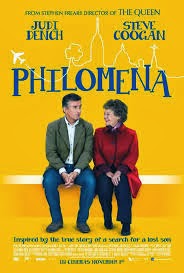Philomena
A movie, starring Judi Dench, as a woman searching for the baby given up for adoption fifty years earlier? Sounds like torture, but I was hopeful given that one of the stars and writers was Steve Coogan, one of my favorite performers these days. And I was right, sort of. Philomena, while essentially a blown up TV movie, has all the elements of schmaltz, but manages to keep a lid on it. It's also a pretty devastating attack on the Catholic church.
Dench, who once upon a time was a great Shakespearean actress, has spent her golden years in films that have accentuated her twinkly quality. But that's tamped down as the title role. She plays a simple old Irish lady, a retired nurse, with dignity and without filigree. After some introductory scenes, when we see her character as a teen, pregnant and unmarried, abandoned by her father to an abbey where she is basically imprisoned and forced to do slave labor (much of this was covered in the excellent The Magdalene Sisters), she decides, on the fiftieth birthday of the boy who was stolen from her by the nuns, to try to find him.
Coogan plays Martin Sixsmith, a former BBC journalist who has been sacked from government work (I didn't get why--I'm sure the British may have knowledge of this). He is approached by Dench's daughter, who is a caterer at a party, with her mother's story. Coogan, after dismissing the daughter because it is a "human interest" story, which therefore isn't worth his time, decides to help her.
The film then becomes a detective story, as the mismatched pair--Coogan is a sophisticate, Dench bourgeois (she reads romance novels, perish the thought) track down what became of her son. They start at the abbey, then are off to Washington, D.C.
I won't spoil what happens next, as I had no idea and some things were complete surprises. Of coures along the way Coogan manages to become a better person from associating with Dench, which is a cliche. But the core of the story--a woman longing to know of the son she has thought of every day for fifty years--is strong enough to hold solid interest.
The other part of it is the condemnation of the church. The nuns were selling the babies of the unwed mothers, and one old nun, in the name of God, does a horrifyingly cruel thing. The way Dench and Coogan's characters deal with it is bracingly refreshing (of course they take different approaches).
Though I liked the film, there are some problems. Most of them have to do with Coogan's character. We don't really understand what makes him change his mind about doing the story, and Coogan is unusually restrained in the performance. Of course I didn't expect Alan Partridge, but at times he seems as if he's been jolted out of slumber. Perhaps he is just stepping aside for Dench, who gives her best film performance since Mrs. Brown, and may even have topped it. Philomena is an unremarkable woman in a remarkable situation, and Dench captures it perfectly.
My grade for Philomena: B.
Dench, who once upon a time was a great Shakespearean actress, has spent her golden years in films that have accentuated her twinkly quality. But that's tamped down as the title role. She plays a simple old Irish lady, a retired nurse, with dignity and without filigree. After some introductory scenes, when we see her character as a teen, pregnant and unmarried, abandoned by her father to an abbey where she is basically imprisoned and forced to do slave labor (much of this was covered in the excellent The Magdalene Sisters), she decides, on the fiftieth birthday of the boy who was stolen from her by the nuns, to try to find him.
Coogan plays Martin Sixsmith, a former BBC journalist who has been sacked from government work (I didn't get why--I'm sure the British may have knowledge of this). He is approached by Dench's daughter, who is a caterer at a party, with her mother's story. Coogan, after dismissing the daughter because it is a "human interest" story, which therefore isn't worth his time, decides to help her.
The film then becomes a detective story, as the mismatched pair--Coogan is a sophisticate, Dench bourgeois (she reads romance novels, perish the thought) track down what became of her son. They start at the abbey, then are off to Washington, D.C.
I won't spoil what happens next, as I had no idea and some things were complete surprises. Of coures along the way Coogan manages to become a better person from associating with Dench, which is a cliche. But the core of the story--a woman longing to know of the son she has thought of every day for fifty years--is strong enough to hold solid interest.
The other part of it is the condemnation of the church. The nuns were selling the babies of the unwed mothers, and one old nun, in the name of God, does a horrifyingly cruel thing. The way Dench and Coogan's characters deal with it is bracingly refreshing (of course they take different approaches).
Though I liked the film, there are some problems. Most of them have to do with Coogan's character. We don't really understand what makes him change his mind about doing the story, and Coogan is unusually restrained in the performance. Of course I didn't expect Alan Partridge, but at times he seems as if he's been jolted out of slumber. Perhaps he is just stepping aside for Dench, who gives her best film performance since Mrs. Brown, and may even have topped it. Philomena is an unremarkable woman in a remarkable situation, and Dench captures it perfectly.
My grade for Philomena: B.



Comments
Post a Comment